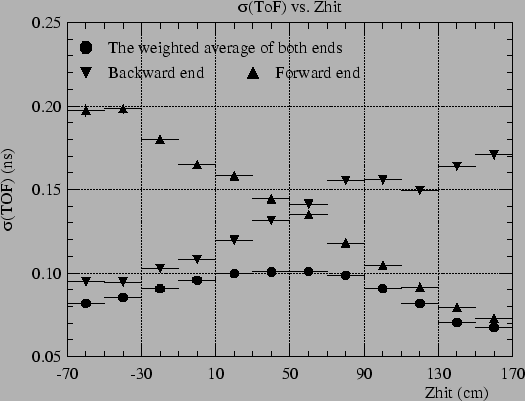



Next: separation
Up: Performance
Previous: PMT gain adjustment
Contents
Muons from 150 

 -pair events corresponding to an
accumulated luminosity of 250
-pair events corresponding to an
accumulated luminosity of 250  were used for
calibration [58]. Electrons in Bhabha events
are frequently accompanied by back splash from ECL behind the TOF
counters and thus can not be used to simulate hadrons reliably.
were used for
calibration [58]. Electrons in Bhabha events
are frequently accompanied by back splash from ECL behind the TOF
counters and thus can not be used to simulate hadrons reliably.
The following empirical formula was used for the time walk correction
to get a precise observed time,
 |
(3) |
where  is the PMT signal time,
is the PMT signal time,  is the particle hit
position on a TOF counter,
is the particle hit
position on a TOF counter,  is the effective velocity of
light in the scintillator, Q is the charge of the signal, S is the
coefficient of time walk, and
is the effective velocity of
light in the scintillator, Q is the charge of the signal, S is the
coefficient of time walk, and
 |
(4) |
The coefficients,  and
and  for n = 0 to 5, were
determined by minimizing residuals defined as
for n = 0 to 5, were
determined by minimizing residuals defined as
 for all available TOF hits. Here,
for all available TOF hits. Here,
 is the time of flight predicted using the track length
calculated from the fit to hits in CDC. The optimization can be done
for all PMTs together or for each PMT separately.
is the time of flight predicted using the track length
calculated from the fit to hits in CDC. The optimization can be done
for all PMTs together or for each PMT separately.
Figure ![[*]](./icons/crossref.png) shows time resolutions for forward and
backward PMTs and for the weighted average time as a function of
shows time resolutions for forward and
backward PMTs and for the weighted average time as a function of
 . The resolution for the weighted average time is about 100 ps with
a small
. The resolution for the weighted average time is about 100 ps with
a small  dependence. This satisfies the design goal, and we expect
further improvement. The distribution of fitted residuals
dependence. This satisfies the design goal, and we expect
further improvement. The distribution of fitted residuals  shows an oscillatory behavior of amplitude of
shows an oscillatory behavior of amplitude of  25 ps as a function
of
25 ps as a function
of  after calibration. This indicates that the 5-th order
polynomial
after calibration. This indicates that the 5-th order
polynomial  does not match the data well, and a better choice of
the formula may give us further improvement.
does not match the data well, and a better choice of
the formula may give us further improvement.
Figure:
Time resolution for  -pair events.
-pair events.
 |




Next: separation
Up: Performance
Previous: PMT gain adjustment
Contents
Samo Stanic
2001-06-02

